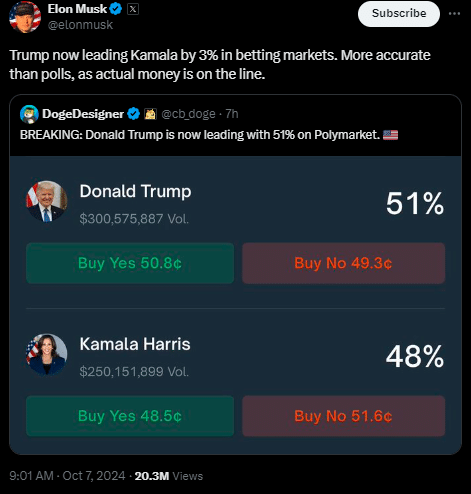Are prediction betting platforms more accurate than traditional polls? The answer to this question will shape all upcoming election campaigns. Elon Musk has sided towards betting platforms in his recent statement on X. Musk suggested that decentralized prediction markets like Polymarket, where participants stake real money on electoral outcomes, provide a more accurate forecast than traditional opinion polls.
If prediction markets continue to show accuracy in their forecasts, they could reshape the way both political insiders and the public approach election predictions, combining financial motivation with digital infrastructure to deliver real-time snapshots of public sentiment.
What separates prediction markets from traditional polling is the money at stake, that drives the decision-making process. Whereas polls rely on voluntary responses, often subject to biases in sample size, question framing, or social desirability, prediction markets involve real money on the line. Traders are motivated to back what they truly believe will happen, knowing they stand to gain or lose based on the accuracy of their predictions.
Polymarket, a decentralized prediction market platform, currently shows Donald Trump leading Kamala Harris by 3%, with 50.6% of bets favoring the former president. In contrast, Harris holds 48.4% of the bets. This shift has been significant, as Harris had previously led on the platform for much of September. However, since early October, Trump’s odds have surged as bettors increasingly back his return to office.

The stakes are high on Polymarket, with $311 million in favor of Trump, compared to $256 million for Harris, marking one of the largest bets in this market. This $1.3 billion marketplace has seen fluctuating odds since President Joe Biden stepped down in July, leaving Harris and Trump as the frontrunners.
Musk’s endorsement comes as decentralized prediction platforms like Kalshi with bets worth $594K, Hedgehog with $11K worth of bets, are gaining popularity for their real-time betting markets. These platforms, where participants place real money on election outcomes, provide an unbiased and transparent view, free from traditional polling’s potential biases and errors.
He emphasized that with money at stake, these platforms offer unbiased and transparent insights compared to the often subjective nature of political polling.
While polls from outlets like the New York Times show Harris with a slight 49% to 47% lead over Trump, betting platforms paint a different picture, fueling debate over their predictive accuracy.
As the November 5 election draws closer, Musk’s endorsement of prediction markets signals a growing trust in decentralized systems, especially in a high-stakes election year. With traditional polling often struggling to capture the complexity of voter behavior, the rise of decentralized platforms may present a viable alternative for political forecasters and campaign strategists alike.
The success or failure of these platforms in predicting major political outcomes like the 2024 U.S. election could influence how they are integrated into mainstream political discourse going forward.
Also Read: Bitcoin Price Jumps to $63K After Trump and Musk Rally








